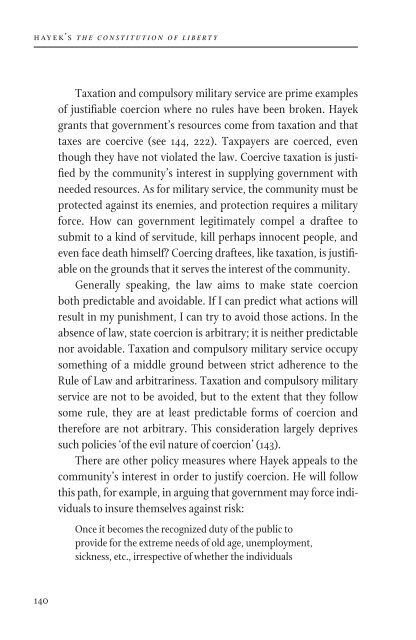Hayek's The Constitution of Liberty - Institute of Economic Affairs
Hayek's The Constitution of Liberty - Institute of Economic Affairs
Hayek's The Constitution of Liberty - Institute of Economic Affairs
You also want an ePaper? Increase the reach of your titles
YUMPU automatically turns print PDFs into web optimized ePapers that Google loves.
h ay e k ’ s t h e c o n s t i t u t i o n o f l i b e r t y<br />
e c o n o m i c p o l i c y a n d t h e r u l e o f l aw<br />
Taxation and compulsory military service are prime examples<br />
<strong>of</strong> justifiable coercion where no rules have been broken. Hayek<br />
grants that government’s resources come from taxation and that<br />
taxes are coercive (see 144, 222). Taxpayers are coerced, even<br />
though they have not violated the law. Coercive taxation is justified<br />
by the community’s interest in supplying government with<br />
needed resources. As for military service, the community must be<br />
protected against its enemies, and protection requires a military<br />
force. How can government legitimately compel a draftee to<br />
submit to a kind <strong>of</strong> servitude, kill perhaps innocent people, and<br />
even face death himself? Coercing draftees, like taxation, is justifiable<br />
on the grounds that it serves the interest <strong>of</strong> the community.<br />
Generally speaking, the law aims to make state coercion<br />
both predictable and avoidable. If I can predict what actions will<br />
result in my punishment, I can try to avoid those actions. In the<br />
absence <strong>of</strong> law, state coercion is arbitrary; it is neither predictable<br />
nor avoidable. Taxation and compulsory military service occupy<br />
something <strong>of</strong> a middle ground between strict adherence to the<br />
Rule <strong>of</strong> Law and arbitrariness. Taxation and compulsory military<br />
service are not to be avoided, but to the extent that they follow<br />
some rule, they are at least predictable forms <strong>of</strong> coercion and<br />
therefore are not arbitrary. This consideration largely deprives<br />
such policies ‘<strong>of</strong> the evil nature <strong>of</strong> coercion’ (143).<br />
<strong>The</strong>re are other policy measures where Hayek appeals to the<br />
community’s interest in order to justify coercion. He will follow<br />
this path, for example, in arguing that government may force individuals<br />
to insure themselves against risk:<br />
Once it becomes the recognized duty <strong>of</strong> the public to<br />
provide for the extreme needs <strong>of</strong> old age, unemployment,<br />
sickness, etc., irrespective <strong>of</strong> whether the individuals<br />
could and ought to have made provision themselves, and<br />
particularly once help is assured to such an extent that<br />
it is apt to reduce individual efforts, it seems an obvious<br />
corollary to compel them to insure (or otherwise provide)<br />
against those common hazards <strong>of</strong> life.<br />
Hayek goes on to explain that the ‘justification in this case is<br />
not that people should be coerced to do what is in their individual<br />
interest but that, by neglecting to make provision, they would<br />
become a charge to the public’ (285–6). Also, government has<br />
the right to expropriate property at fair market value to provide<br />
such amenities as parks and recreation, ‘so long as the community<br />
approves this’ in full awareness <strong>of</strong> the costs and alternatives<br />
(375). Education up to a minimum standard can be made compulsory.<br />
<strong>The</strong> justification, aside from the contribution to democratic<br />
governance, is that ‘all <strong>of</strong> us will be exposed to less risks and<br />
will receive more benefits from our fellows if they share with us<br />
certain basic knowledge and beliefs’ (377). Higher education is not<br />
compulsory, but the case for subsidising it ‘must rest not on the<br />
benefit it confers on the recipient but on the resulting advantages<br />
for the community at large’ (382–3).<br />
140<br />
141












